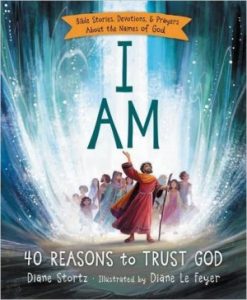We associate I AM (in capital letters) as the Lord’s name from Exodus 3. The “to be” verb is significant because the Lord just IS. Meaning, he is (as Jack Cottrell puts it) “self-existent and eternal.” But we need to be aware that not all spiritual-sounding messages mean the same thing by I AM. Self-help guru Wayne Dyer produced a children’s book by that title to teach kids that “we are not separate from God—we are God!” Even Christian messages can cross the New Age line by hinting that when we use “the power of I AM” and tell ourselves “I am ___,” we can create reality; that is, we can attract the positive and will it to happen as we wish.
Then there are the Christian contemplatives, who make so much of Psalm 46:10. But when those on that mystical path begin scooting aside Scripture and the doctrine of the atonement . . . well, I can’t help worrying that their quoting of that verse is more a personal statement than the words of God. Which makes God’s quote of “Be still, and know that I am God” mean “Saying the mantra will take me to the stillness of the altered state of consciousness, where I’ll perceive that I am God.”
Within some of the I AM talk, we also find the term “true self.” This too sounds good. (After all, I want to be the real me, the best me I can.) But the term “true self” can be code for “becoming enlightened to the truth that you are God.”
I’ve yet to meet anyone who’s qualified to be God. No problem. What a relief that the Creator God, the Almighty Lord of the Word, is the forever and the only I AM!
(Oh, and the children’s book you want is Diane Stortz’s I AM: 40 Reasons to Trust God.)



I thought I should check out the book and author as featured above: I AM by Diane Stortz. I was exploring her site and blog and immediately found her quoting Eugene Peterson in what seems an approving way. I am forwarding (I hope) the page I read. I guess I’ll pass on Mrs. Stortz.
http://www.dianestortz.com/quotable-on-getting-to-know-others-well/#respond